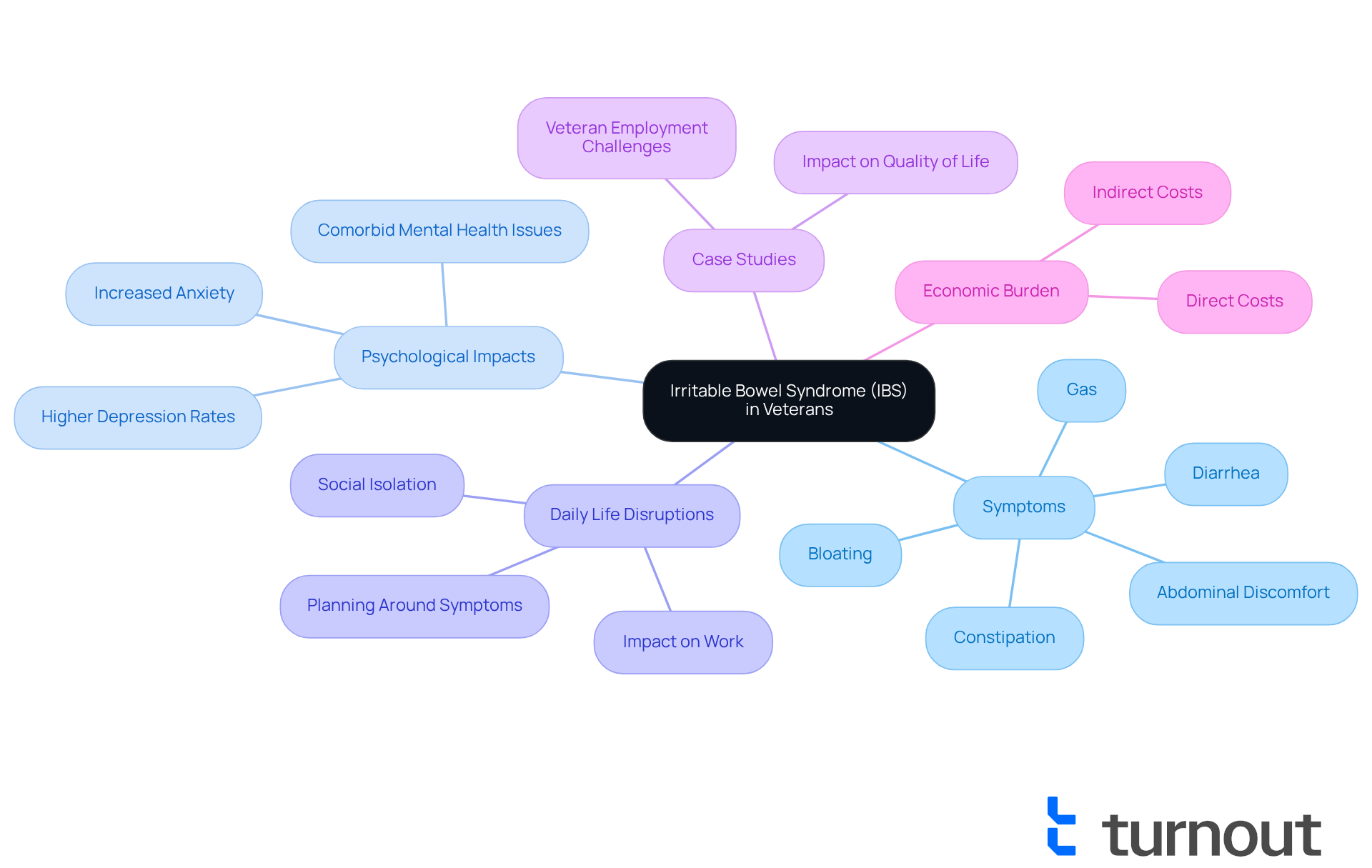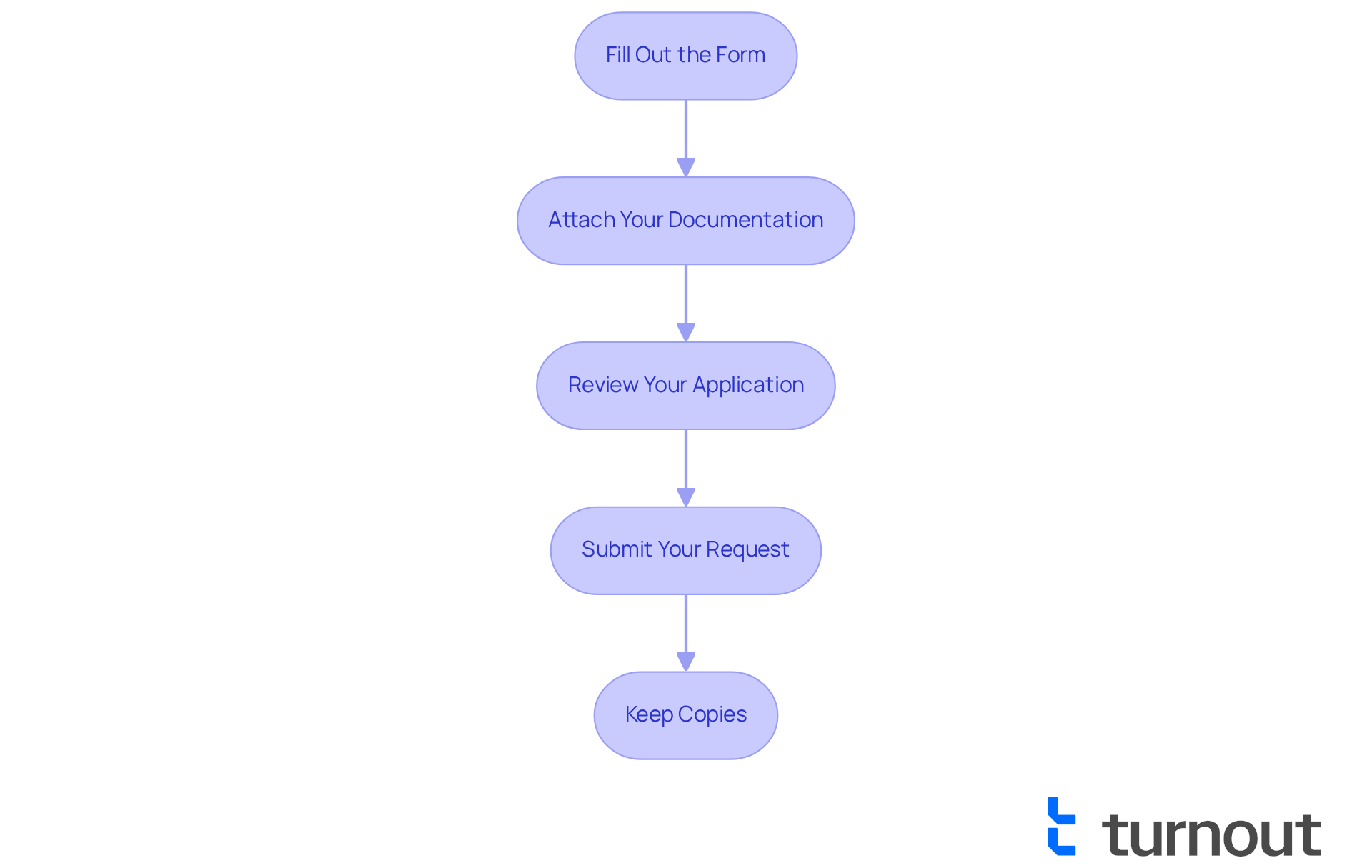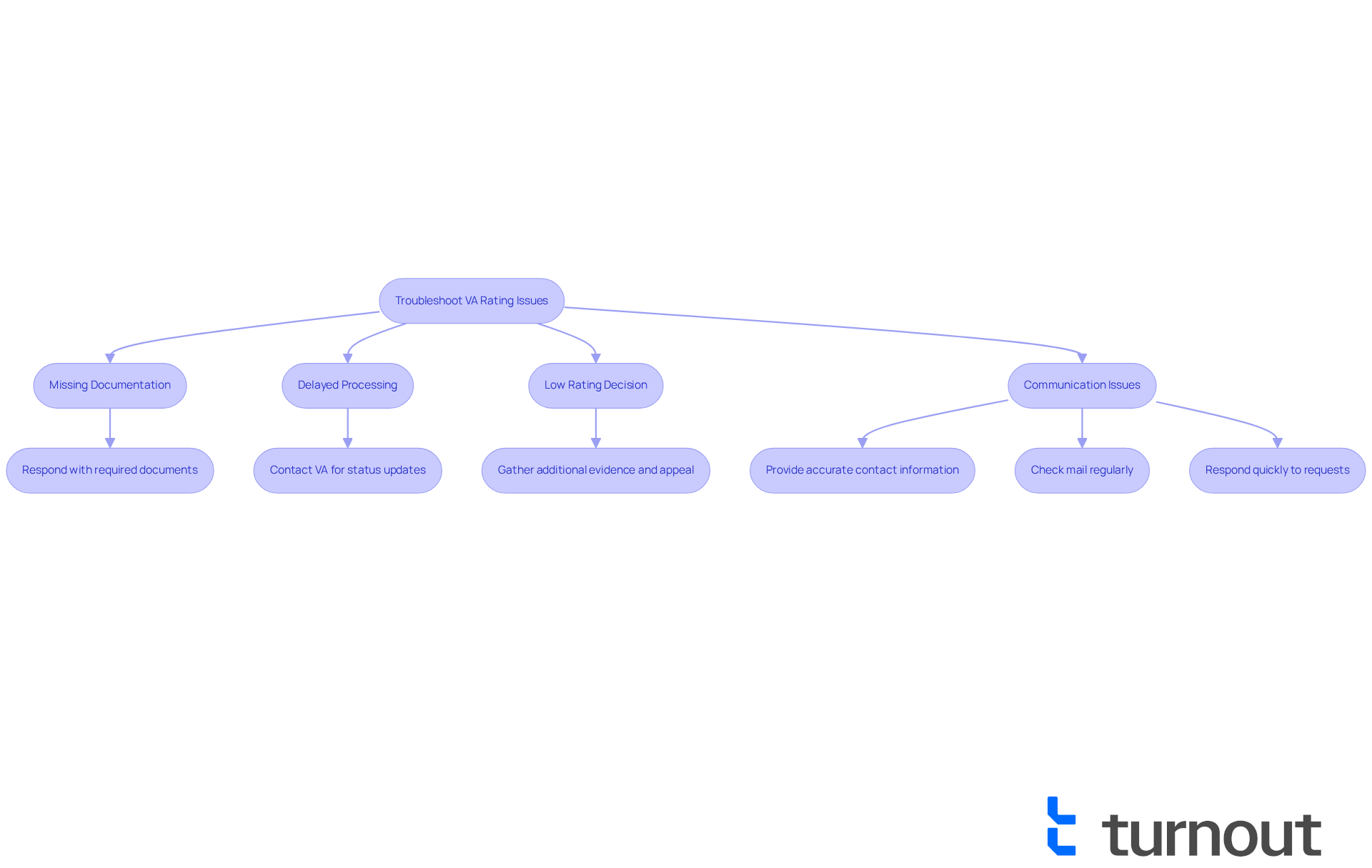Overview
The article aims to support veterans in navigating the process of obtaining a VA rating for Irritable Bowel Syndrome (IBS). We understand that this journey can be challenging, and we are here to guide you through the necessary steps and documentation required.
IBS can significantly impact your daily life and mental health, and it’s important to acknowledge these struggles. By providing a structured approach to effectively submit your application, we hope to increase your chances of receiving the benefits you deserve.
Remember, you are not alone in this journey. With the right support and information, you can take the necessary steps toward securing your VA rating for IBS.
Introduction
Irritable Bowel Syndrome (IBS) is not merely a gastrointestinal disorder; for many veterans, it poses a significant barrier to daily life and overall well-being. We understand that the complex symptoms of IBS, often intensified by the stresses of military service, can lead to profound disruptions in work, social interactions, and mental health.
This article aims to provide a comprehensive, step-by-step guide to navigating the VA rating process for IBS. Our goal is to empower veterans with the tools they need to document their experiences and advocate for the support they truly deserve. It's common to feel overwhelmed by the VA's notoriously intricate procedures. So, how can veterans ensure their claims are accurately represented and not overlooked?
You're not alone in this journey. We're here to help you find the answers you need.
Understand Irritable Bowel Syndrome and Its Impact on Veterans
Irritable Bowel Syndrome (IBS) is a chronic gastrointestinal condition that can profoundly affect your daily functioning and overall well-being. Symptoms such as abdominal discomfort, bloating, gas, diarrhea, and constipation can be particularly challenging for former military personnel. The stress linked to military service, deployments, and the transition to civilian life often exacerbates these symptoms. For instance, a notable study found that 63% of Gulf War participants reported gastrointestinal issues, including IBS, highlighting the prevalence of this condition among those who have served.
Veterans living with IBS frequently express how this disorder disrupts their daily routines. One individual shared, "Living with IBS means I have to plan my day around my symptoms." It impacts everything from work to socializing; the concern of finding a restroom can overshadow simple outings. This experience resonates with many veterans, as IBS can lead to missed workdays and social isolation, complicating the adjustment to civilian life.
The effects of IBS extend beyond the physical realm; they also carry psychological implications. Veterans with IBS often report higher rates of anxiety and depression. Studies indicate that these comorbidities are common among those suffering from gastrointestinal disorders. For example, a recent analysis revealed that individuals with IBS-D (diarrhea-predominant IBS) frequently confront significant mental health challenges, which can hinder their ability to manage daily tasks effectively.
Case studies illustrate the hurdles faced by former service members with IBS. One study emphasized an individual who, despite being physically capable, struggled to maintain employment due to the unpredictability of his symptoms. This situation underscores the importance of documenting how irritable bowel syndrome affects daily life when preparing a VA rating application for irritable bowel syndrome VA rating. Providing detailed accounts of how irritable bowel syndrome VA rating influences work, social interactions, and overall quality of life can strengthen your case, offering the VA a clearer understanding of the severity of the condition.
Moreover, the economic burden of IBS on former military personnel is considerable, leading to substantial direct and indirect costs. Understanding the manifestations of IBS and its impact on daily life is essential for those seeking support. Turnout provides access to tools and services that assist former military personnel in navigating the complexities of government benefits, including support with SSD claims related to IBS. It’s important to note that Turnout is not a law firm and does not provide legal representation; instead, they utilize trained nonlawyer advocates and work with IRS-licensed enrolled agents to support clients in their respective processes. By effectively documenting these challenges and utilizing Turnout's resources, you can advocate for the recognition and assistance you deserve in navigating the VA rating process.

Gather Required Documentation and Evidence for Your Application
To effectively support your application for an irritable bowel syndrome va rating, we understand that gathering comprehensive documentation is essential. This process can feel overwhelming, but we’re here to help you navigate it. Here are some key components to include:
-
Medical Records: Secure detailed records from your healthcare providers that outline your IBS diagnosis, treatment history, and any complications that may arise from the condition. This documentation is crucial for establishing the severity and impact of your irritable bowel syndrome va rating.
-
Personal Statements: Craft a personal statement that articulates how IBS affects your daily life. Include specific examples that illustrate its impact on your work, social interactions, and overall quality of life. Personal narratives can significantly enhance your argument by providing context to your irritable bowel syndrome va rating.
-
Buddy Statements: Request statements from friends, family, or fellow veterans who can attest to your experiences with IBS. These corroborative accounts can offer further backing for your assertion, emphasizing the condition's effects from an outside perspective.
-
Service Records: If relevant, include any service records that may indicate stressors or conditions during your military service that could have contributed to your IBS. This information can help establish a connection between your service and issues related to your irritable bowel syndrome va rating.
-
Cautions and Best Practices: It’s common to feel uncertain about the process, but be aware that if your condition has worsened, you must submit new evidence to support your claim. This is vital for ensuring that your submission reflects your current health status.
Arranging this documentation in a clear and concise manner will promote a smoother procedure, enhancing your chances of a favorable result. Remember, the more comprehensive and well-supported your submission for irritable bowel syndrome va rating, the greater your likelihood of obtaining the benefits you deserve. After gathering your documentation, consider reaching out to veteran support organizations for additional assistance in submitting your claim. You are not alone in this journey.

Submit Your VA Rating Application: Step-by-Step Process
To successfully submit your application for the irritable bowel syndrome VA rating, we recognize that navigating this process can feel overwhelming. But by following these essential steps, you can make it more manageable:
-
Fill Out the Form: Take your time to accurately complete VA Form 21-526EZ, the request for disability compensation. It’s important to ensure that every section is thoroughly completed to avoid delays that can add to your stress.
-
Attach Your Documentation: Include all necessary documentation, such as medical records, personal statements, and buddy statements, to support your claim. Robust medical perspectives can significantly enhance your submission, providing the evidence needed to strengthen your case.
-
Review Your Application: Carefully double-check all information for accuracy and completeness. Unfinished submissions can lead to considerable delays. It’s common to feel anxious about this, but remember, statistics show that 80% of veterans with irritable bowel syndrome VA rating are underrated by the VA, often due to common mistakes like missing deadlines or omitting critical information.
-
Submit Your Request: You can submit your request online via the VA's website, by mail, or in person at your local VA office. If you choose to mail it, consider using a trackable service to confirm delivery. Also, ensure that your Direct Deposit Information is accurate to avoid delays in receiving benefits if your claim is approved.
-
Keep Copies: Make duplicates of your submission and all supporting documents for your records before sending. This is crucial for future reference or in case you need to appeal.
By following these steps, you can improve the chances of a seamless and effective procedure. Learning from successful case studies can provide valuable insights. For instance, Glenn Sharkey shared, "With their expertise, my rating increased from 10% to 100%, significantly improving my quality of life." Remember, you are not alone in this journey; we’re here to help you navigate the VA claims process.

Troubleshoot Common Issues in the VA Rating Application Process
While submitting your VA rating request, you may encounter several common issues. We understand that this process can be challenging, and we're here to help you troubleshoot them:
-
Missing Documentation: If the VA requests additional information, respond promptly with the required documents. Keeping a checklist of what you submitted can help you monitor your submission effectively.
-
Delayed Processing: It's common to feel anxious about delays. If you experience them, please contact the VA to check the status of your application. Utilize the VA's online tools or call their customer service for updates.
-
Low Rating Decision: Receiving a lower rating than expected can be disheartening. Remember, you have the right to appeal. Gather additional evidence and consider seeking assistance from a veteran service organization for guidance.
-
Communication Issues: Ensure you provide accurate contact information and check your mail regularly for any correspondence from the VA. Responding to any requests for information as quickly as possible is crucial.
By being proactive and prepared, you can navigate these common issues effectively. In fiscal year 2025, the VA handled over 2 million disability benefits requests, achieving an accuracy rate surpassing 92%. The VA is also on track to surpass the previous record number of completed disability claims by more than 14% this year. However, many former service members still encounter challenges, as shown by reports of payment delays and communication difficulties. For instance, one veteran expressed frustration, stating, "I still have not received my VA benefits. I have called about this issue three times now." This highlights the importance of maintaining open lines of communication with the VA. Remember, addressing these issues promptly can significantly improve your chances of a successful outcome. You are not alone in this journey.

Conclusion
Navigating the VA rating process for Irritable Bowel Syndrome (IBS) can feel overwhelming. We understand that the intricacies of this journey are crucial for veterans seeking the support they deserve. By recognizing the impact of IBS on daily life and mental well-being, veterans can better articulate their experiences and advocate for their needs during the application process.
This article highlights the importance of thorough documentation, including:
- medical records
- personal statements
- service records
to strengthen a VA rating application. Completing the appropriate forms, attaching necessary evidence, and proactively addressing potential issues are vital steps to ensure a smooth submission. Insights shared by veterans who have successfully navigated this process serve as a valuable reminder that persistence and attention to detail can lead to favorable outcomes.
Ultimately, securing a VA rating for IBS is not just about navigating paperwork; it’s about acknowledging the profound effects this condition has on the lives of veterans. By taking informed steps and utilizing available resources, veterans can effectively advocate for their health and well-being. It’s essential to remain proactive and engaged throughout the process. The support and recognition of their struggles can significantly enhance their quality of life.
Frequently Asked Questions
What is Irritable Bowel Syndrome (IBS) and how does it affect veterans?
Irritable Bowel Syndrome (IBS) is a chronic gastrointestinal condition characterized by symptoms such as abdominal discomfort, bloating, gas, diarrhea, and constipation. For veterans, these symptoms can significantly disrupt daily functioning and overall well-being, particularly due to the stress associated with military service and transitioning to civilian life.
How prevalent is IBS among military personnel?
A study highlighted that 63% of Gulf War participants reported gastrointestinal issues, including IBS, indicating a high prevalence of this condition among veterans.
What impact does IBS have on the daily lives of veterans?
Veterans with IBS often have to plan their daily activities around their symptoms, which can lead to missed workdays, social isolation, and challenges in maintaining a normal routine, including the stress of finding restrooms during outings.
Are there psychological effects associated with IBS in veterans?
Yes, veterans with IBS frequently report higher rates of anxiety and depression. Studies show that these mental health challenges are common among individuals suffering from gastrointestinal disorders, particularly those with diarrhea-predominant IBS (IBS-D).
How can veterans document the impact of IBS for VA rating applications?
Veterans are encouraged to provide detailed accounts of how IBS affects their work, social interactions, and overall quality of life. This documentation can strengthen their case when applying for a VA rating for IBS.
What economic burdens do veterans with IBS face?
The economic burden of IBS on former military personnel is significant, leading to both direct and indirect costs, which can complicate their financial situation.
What resources are available for veterans seeking support related to IBS?
Turnout offers tools and services to help veterans navigate government benefits and support with SSD claims related to IBS. They provide assistance through trained nonlawyer advocates and IRS-licensed enrolled agents, but do not offer legal representation.
Why is it important for veterans to understand the manifestations of IBS?
Understanding how IBS manifests and impacts daily life is crucial for veterans seeking support, as it enables them to effectively advocate for recognition and assistance in navigating the VA rating process.




